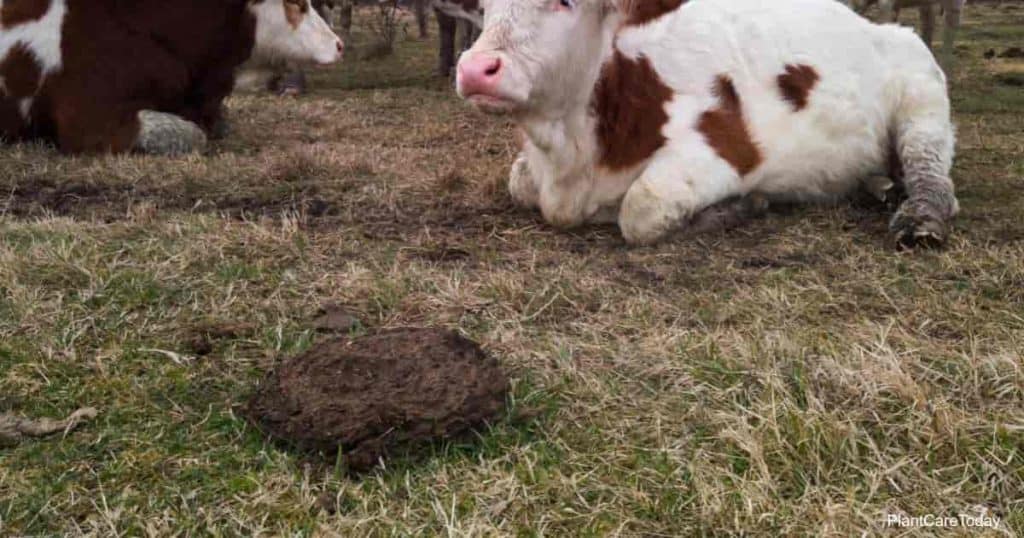Steer manure is an excellent way to enrich garden soil when used properly as a soil amendment.
Steer poop contains high amounts of organic matter with plenty of nutrients necessary for healthy plant growth.

Using manures, such as chicken, cow, or horse manure compost isn’t the same as using fertilizer. But, manure only restores nutrients the soil already had.
Adding a blend of steer manure and compost to existing soil reduces the need for crop rotation or soil replacement.
But what about steer manure?
Is it better than other popular manures, or should you stick with something more common?
What Is The Difference Between Manure Cow VS Steer?
Cow manure is not as potent at Steer manure.
The former has a mild N-P-K (nitrogen/phosphorus/potassium) ratio of 10-4-8. Meanwhile, steer manure has a much higher potency of 14-5-8.
This makes the cow manure a safer “fertilizer” for most garden needs as an all purpose soil amendment.

Always use caution when applying too much steer manure. It has a higher chance of burning plants and also may contain more salt or weed seeds than that of dairy cows.
But, when you have plants in need of extra nitrates, it wins over dairy cow manure easily.
Is Chicken Better Than Steer Manure?
The choice of using chicken or steer manure depends upon your goal.
Chicken poop fertilizer (manure) contains approximately:
- Twice as much phosphates
- Three times as much nitrogen
… as the same amount of steer manure.
This makes it (chicken) better for a fertilizer supplemental additive.
But, steer manure provides far better texture than poultry manure.
This makes (steer) a superior soil amendment when the goal is to improve overall soil quality over building primary nutrition.

Is Steer Manure Good For Tomatoes?
You probably already know the beer trick, but manure is a great way to get the ball rolling.
Make sure to amend the soil with manure 2 to 4 weeks prior to planting or transplanting the tomatoes. This allows a chance to the “mix” to dilute more.
Aim for an approximately 1:2 ratio of manure mix to soil blended well to a depth of 1’ foot.
Top this with mulch to prevent any nitrogen escape.
How do you reduce the risk of pathogens or infestation in edible crop soil?
A good rule of thumb is to make sure any horse or cow manure in compost is added at least 120 days prior to the estimated harvest of any edible crop.
Do Roses Like Steer Manure?
Unless you recycle coffee grinds, your roses may be in dire need of nitrates.
Adding manure in the same way as for tomatoes will allow the new rose plant to thrive.
More on Natural Fertilizer for Tomatoes
It is a good idea to rake in some well composted manure in early and late spring. Add a third application in early summer, putting the mulch back on top afterwards.
There is a good general rule of thumb when planning to add steer manure on flower beds or in vegetable gardens.
A lawn requires no more than 5 gallons per 100’ feet square. Staying close to that ratio when adding to garden plants will prevent overamending.
Remember, manure restores nutrients to the soil and is not meant to be used as a plant food.
Does Steer Manure Spoil?
Manure doesn’t have the same type of shelf life as chemical fertilizers.
In fact, you’ll actually want to ferment the manure before using it to make it safe.
Raw steer poop contains a number of pathogens, such as E. coli, as well as salt.
Animal manures you buy at a garden center has been composted to make it safe for use.

When obtaining fresh steer poop, composting should be your first priority.
Hot composting is one of the fastest methods. The aim is to bring the core temperature of your compost pile to at least 135° degrees Fahrenheit for three days. Then the compost pile gets turned.
The resulting composted manure will have slightly reduced nitrogen content. But, much of the salt, seeds, and harmful pathogens will be gone.
Composting manure may also be done by adding the fresh manure to your regular composting mix. This compost will need at least 6 months before becoming safe to use.
A third method to age the poop is to dry it out over a period of 6 to 12 months.
This will also kill most of the pathogens without reducing nutrients.
Will Steer Manures Burn Plants?
When steer dung is too fresh or applied too thick to flower beds, it can cause burns or other damage to plants. The reason is due to the high salts and the high amount of nitrogen it contains.

Veggies are also at risk of soaking up pathogens if you’re using fresh manures.
The high salt content needs to be composted out properly before use or damage can occur.